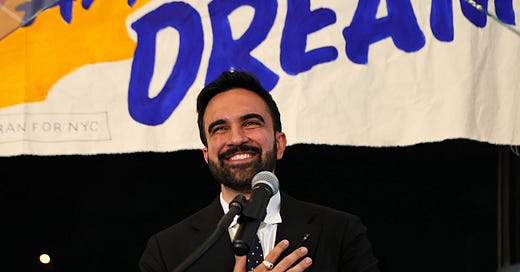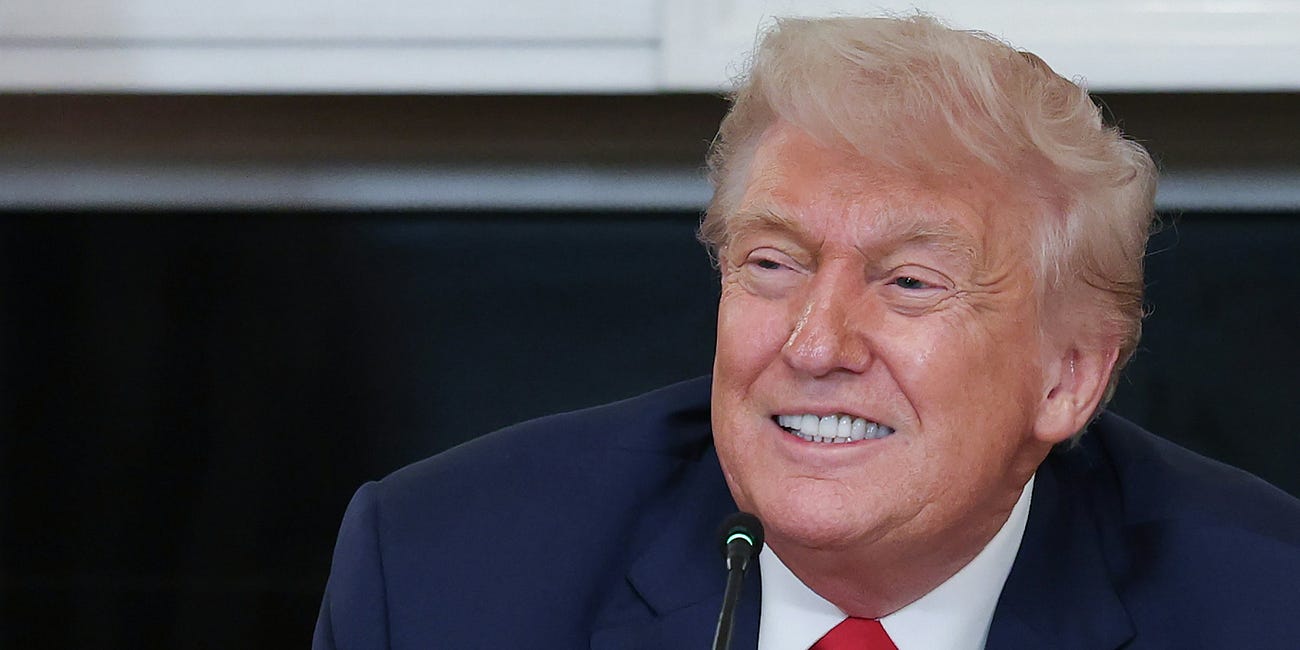Zohran Mamdani Reminds Me of Someone. His Name Was Mario Cuomo.
There once was another son of immigrants from Queens who spoke eloquently about economic justice—the father of the man to whom we say today good riddance.
by Jim Sleeper
Which candidate, running as an underdog in New York’s Democratic primary election, said the following?
“Once the middle class goes over to the right with the rich, they bludgeon the poor. The whole society suffers because of the social disorientation that produces crime, deterioration, everything evil. You cannot live with a large part of this state or nation deprived. It can’t be done. You can’t build a wall between you and them and say maybe they’ll go away.… You can’t leave it to the rich to do the right thing, any more than we could leave it to the business people to provide safe quarters for the garment workers a hundred years ago. That’s why people burned to death in factories.… You need unions the same way you need policemen. You need laws that say to the rich, you’re gonna have to share some of your wealth—that’s why we have the income tax.”
You might well assume that those are Zohran Mamdani’s words. But they were spoken to me by Mario Cuomo, the father of Andrew Cuomo, in April 1982, during his underdog gubernatorial campaign against Ed Koch, which I was profiling for The Village Voice.
Koch had defeated Cuomo five years earlier in New York City’s mayoral election, partly by pitching the death penalty, which Cuomo bravely resisted. And now Cuomo was polling seven points behind Koch statewide. Yet, somewhat like the underdog Mamdani in 2025, Mario Cuomo was drawing positive attention in 1982 by campaigning with tremendous energy, charm, and eloquence. To the surprise of the Democratic Party establishment of that time, Democratic primary voters in 1982 spurned the overdog Koch for the underdog Cuomo, somewhat as primary voters now have spurned the overdog Andrew Cuomo for the underdog Mamdani. The similarities, and the ironies, are instructive.
Like Zohran in 2025, Mario in 1982 did champion economic justice and ethno-racial inclusion. Like Zohran, Mario too was a son of immigrants in Queens, and he’d become a strong advocate for justice and comity across ethno-racial lines on behalf of a broader civic vision. Like Zohran, Mario was subjected to rumors that he harbored antisemitic views, even though, as I noted in the Voice profile, there wasn’t a shred of evidence to suggest them. Like Mamdani, who already holds public office as a member of the New York State Assembly, Mario Cuomo was lieutenant governor under Governor Hugh Carey, although that office was so purely ceremonial that at one point, Carey told a reporter that he wasn’t sure where his lieutenant governor was or what he was doing. (Small wonder that the Voice later archived my 1982 profile, the first really in-depth piece on Cuomo, under the headline, “The article that made Mario Cuomo governor—No Kidding!”) In June 1982, when Cuomo was still trailing Koch, the headline had been, “Cuomo: Too True to be Good?”
That same question is being asked now too, not about the younger Cuomo but about Mamdani, even by some of his well-wishers: Will he turn out to be oratorically progressive and rousing but insufficiently seasoned and hard-ass—and too readily stymied, as Barack Obama and former New York Mayor Bill de Blasio often were? Obama’s chief stymier was Mitch McConnell. In de Blasio’s case, it was a governor named Andrew Cuomo, who made sure that “de Blasio became a scapegoat by design for the city’s shortcomings as Cuomo often undermined him whenever possible.”
Andrew—whom I first quoted when he was 24, just weeks out of law school—was co-managing his father’s 1982 campaign. He played hardball. He may even have undermined his father at times or handled him in ways calculated to advance his own fortunes alongside those of his dad. Their father-son competitiveness was often vigorous, intimidating, sometimes bitter, even in bonding, as Michael Shnayerson’s biography of Andrew, The Contender, shows well.
They were alike, in some ways, father and son. Mario could be cutthroat. He would call Albany reporters when they wrote a story he didn’t like and keep them on the phone for 45 minutes, complaining. And for all his inspiring eloquence—and at his best, he had few equals—he didn’t always offer much in the way of follow-through. In one State of the State Address as governor, he declared the “Decade of the Child.” A couple years later, when the condition of the state’s children had not markedly improved, Albany wags joked: “But he didn’t mean this decade.”
For all that, more striking today are the ways in which father and son were different. Mario had a compassion about him that was not merely emotional. It was philosophical, rooted in his sense of history and social justice and his Catholicism. During a decade (the 1980s) when American politics swung hard to the right and a depressing number of Democrats veered that way themselves—and a decade, by the way, in New York City when the first real estate boom started, kicking off the affordability crisis that Mamdani made the center of his campaign—Mario refused to stop talking about things that the 1980s had made unfashionable: the poor, inequality, unnecessary suffering in this land of plenty.
All of the ways in which Andrew compares poorly to Mario should be understood now alongside legitimate questions about whether Zohran Mamdani can step up to the incredibly demanding job of mayor (of course, he’s not there yet). Yes, Andrew Cuomo could stand up to Donald Trump, as one tough guy from Queens to another. But the danger in that pairing is that it takes one to know one. We’re lucky to have escaped it, no matter what lies ahead.
Warning for Trump as Surprise Poll Offers Harsh Verdict on Iran Strike
If any political commentators or Democratic politicians are tempted to see the political battle over President Trump’s bombing of Iran through the prism of the run-up to the Iraq War two decades ago, here’s a tip: Don’t.
The Republican Plot to Un-Educate America
The Trump administration’s bombastic attacks on the nation’s most prestigious universities have commanded the public’s attention all year long. Now congressional Republicans are poised to dramatically expand that onslaught. If you think the last few months have been bad for Harvard, brace yourself—the “big, beautiful bill” is com…








A pox on both their houses. The article seems oddly enamored with the idea that Zohran Mamdani is a kind of reincarnation of Mario Cuomo, but it conveniently skips over a crucial difference: Mamdani is a Democratic Socialist, not merely a progressive Democrat. What part of “socialist” in “Democratic Socialists of America” does the author not understand? This is not a movement open to moderation or individual conscience. If Mamdani deviates from the DSA party line—and they do have one—he knows the leadership and base will fall on him like the Furies. Just ask anyone who’s strayed.
If anything, we should expect him to govern, if given the chance, in the mold of Chesa Boudin: ideologically rigid, allergic to compromise, and dismissive of public concerns that don't fit the theory. That is not the temperament of a democratic leader—it’s the formula for political isolation and public backlash.
As for the Cuomos, the contrast between Mario’s lofty rhetoric and Andrew’s bare-knuckle ambition is real, but neither emerges as a model. Mario was more philosopher-king than executive—long on speeches, short on delivery. His celebrated compassion too often floated above the political ground, never quite anchored in durable reform. Andrew, on the other hand, mastered power for its own sake, weaponizing government against rivals and allies alike. Neither represents the kind of principled, results-driven leadership that centrists or classical liberals should champion.
We need public servants who blend moral seriousness with institutional competence, not tribunes of grievance or machines of ambition. Romanticizing the DSA’s most disciplined ideologue as the heir to Mario Cuomo’s unrealized idealism only underscores how far removed this narrative is from the hard, necessary work of liberal democratic governance.